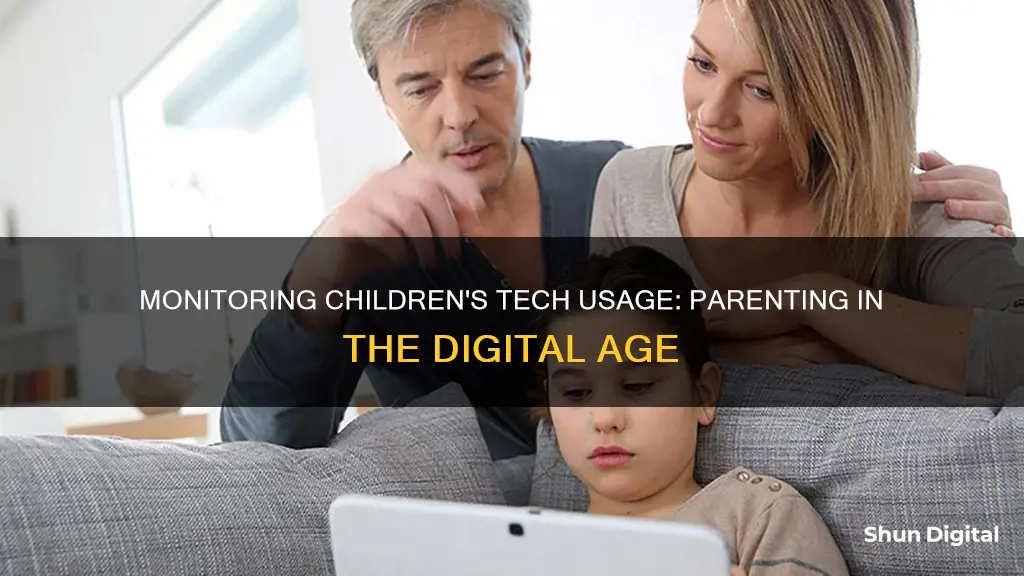
With the ever-growing presence of technology in our lives, parents are increasingly faced with the challenge of deciding how to monitor their children's tech usage. This is a complex issue, as parents want to ensure their children's safety and well-being while also respecting their privacy and independence. On the one hand, monitoring can help protect children from online dangers such as cyberbullying, sexting, and online predators. It can also help parents limit screen time and safeguard their children's personal information and reputation. On the other hand, some parents worry about invading their children's privacy and whether monitoring is truly effective, as kids can often find ways around parental controls. Ultimately, each family must decide what approach works best for them, balancing safety and privacy in the digital age.
| Characteristics | Values |
|---|---|
| Reasons for monitoring | Cyberbullying, sexting, online predators, safeguarding reputation and personal information, identity theft, viruses and malware |
| Monitoring methods | Checking web history, social media profiles, phone call records, messages, location tracking, parental controls, tracking tools |
| Parental concerns | Inappropriate content, social media influencers, inappropriate language, age-inappropriate content, screen time |
| Parental actions | Taking away devices, Blocking numbers, Threatening to take away Wi-Fi, Limiting screen time, using digital "grounding" |

Cyberbullying
- Monitor their children's online activity: Parents should be aware of what their children are doing online and on their devices. This includes checking their web history, social media profiles, and text messages. While this may be seen as an invasion of privacy, it is important for ensuring their child's safety.
- Set up parental controls: Parents can use technological tools to block or filter their children's internet access and restrict certain apps or websites. This can help prevent cyberbullying and limit their child's exposure to inappropriate content.
- Educate their children about online safety: Parents should talk to their children about the risks of cyberbullying and how to protect themselves. They should encourage their children to report any instances of cyberbullying and teach them about safe internet usage, such as not sharing personal information or passwords.
- Encourage open communication: It is important for parents to create an environment where their children feel comfortable talking to them about any issues they may be facing online. This can help parents identify if their child is being cyberbullied and provide an opportunity to address the issue together.
- Report cyberbullying: If a child is being cyberbullied, parents should take it seriously and report the behavior to the appropriate authorities, such as the child's school or the police. They should also encourage their child to block the bully on their devices and report the behavior to the relevant social media platforms or service providers.
- Limit screen time: While this may not directly address cyberbullying, limiting the amount of time children spend online or in front of screens can reduce their exposure to potential cyberbullying and help improve their overall well-being.
By taking these steps, parents can help protect their children from the harmful effects of cyberbullying and teach them how to navigate the online world safely and responsibly.
Monitoring CPU Usage: MSI Afterburner Guide
You may want to see also

Sexting
Parents can monitor their children's text messages and online activity to prevent sexting. Over 60% of parents report monitoring their children's text messages, and 81.1% say they monitor their child's internet browsing. However, it is worth noting that children can often find ways around parental controls, so it is important to also encourage responsible internet usage and have open conversations about online safety.
Parents can also use technological solutions to monitor their children's online activity. This includes using parental controls, blocking or filtering tools, and location tracking services. However, these methods are less commonly used, with only 39% of parents turning to these solutions.
In addition to monitoring, parents can also limit their children's screen time and restrict their access to certain devices as a form of discipline. This can be an effective way to reduce the risk of sexting, as it limits the opportunity for such behaviour.
While monitoring can be helpful, it is important for parents to also educate their children about online safety and responsible internet usage. This includes talking about the risks and consequences of sexting and helping them understand why it is important to protect their privacy and personal information.
By combining monitoring with education, parents can help their children navigate the digital world safely and responsibly.
Monitoring CPU Usage: MSI Afterburner Guide
You may want to see also

Online predators
To protect children from online predators, parents can take several measures. Firstly, it is important to monitor children's online activity, including their internet browsing history and social media profiles. This can be done through personal engagement or by using parental controls and tracking tools. Additionally, parents can educate their children about online safety, teaching them to recognize the signs of predatory behaviour and how to respond appropriately. Setting rules for online chatting, such as time limits and parental guidance, is also essential.
Furthermore, children should be encouraged to maintain their privacy settings and limit the personal information they share online. They should be cautious when interacting with strangers and avoid sharing personal details, such as hobbies, family information, or private photographs. If a child encounters a potential online predator, they should remain calm, refuse inappropriate requests, and inform their parents or authorities immediately.
By combining monitoring with education and safety measures, parents can help protect their children from the dangers of online predators.
Monitoring Water Usage: Strategies for Schools
You may want to see also

Inappropriate content
The internet and digital devices provide children with access to a vast array of information and content, some of which may be inappropriate. Inappropriate content can include violent or sexual material, cyberbullying, and online predators. As such, many parents feel it is important to monitor their children's technology usage to ensure their safety and protect them from harmful content.
Cyberbullying
Cyberbullying is a significant concern for parents, as most children who are harassed online suffer emotional distress but never inform their parents. Monitoring can help parents identify if their child is being bullied or is bullying others, allowing them to intervene and provide support.
The internet provides access to a wide range of content, including violent, sexual, and otherwise inappropriate material. Parental monitoring can help prevent children from accidentally or intentionally accessing such content, which could be detrimental to their well-being and development.
Online Predators
The internet has become a common tool for child predators to find and befriend potential victims. By monitoring their children's online activities, parents can help protect them from potential dangers and intervene if necessary.
Inappropriate Language and Behaviour
In addition to explicit content, parents are also concerned about their children encountering inappropriate language and behaviours online. This includes exposure to violent or sexual discussions, as well as the potential for their children to engage in risky behaviours, such as sexting or sharing personal information.
Age-Inappropriate Content
Children may also come across content that is not suitable for their age group. This can include violent or sexual material, but also content that is generally intended for more mature audiences, such as older teenagers or adults.
While some parents opt for spot-checking their children's devices, others prefer to use technological tools to filter and restrict access to certain websites or applications. These tools can provide an additional layer of protection and help parents feel more confident in their children's online safety.
CenturyLink Internet Usage: Monitor, Track, and Manage Your Data
You may want to see also

Screen time limits
- Prevalence of Screen Time Limits: A significant number of parents set limits on their children's screen time. In a survey, 83.3% of parents indicated that they monitor the duration of their children's technology usage. Among parents of younger teens (aged 13-14), 69% reported limiting their children's online time, compared to 46% of parents of older teens (aged 15-17).
- Methods for Limiting Screen Time: Parents employ various methods to control their children's screen time. This includes setting time limits on internet usage, using parental controls, and restricting access to certain devices or platforms. Some parents opt for spot-checking their children's devices, while others prefer to use filtering tools like iOS and Android profiles to manage their children's online activities.
- Parental Concerns: Many parents are concerned about the potential negative impacts of excessive screen time on their children's well-being and development. They worry about the long-term effects of smartphones and other digital devices on their children's interpersonal skills, ability to form healthy friendships, and overall development.
- Age Considerations: The appropriateness of screen time limits varies with the age of the child. Parents generally become more lenient as children get older. While only 22% think it is acceptable for a child under 12 to have their own smartphone, 45% believe smartphone ownership is acceptable between the ages of 12 and 14, and this percentage increases further for older age groups.
- Parental Challenges: Setting and enforcing screen time limits can be challenging for parents. More than half of parents with minor children acknowledge spending too much time on their smartphones, and about 70% admit to being distracted by their phones when spending time with their children. This highlights the difficulty of balancing their own technology usage while imposing limits on their children.
- Alternative Approaches: While limiting screen time is important, it is also crucial to encourage responsible internet usage. Parents can serve as role models and educate their children about online safety. By fostering an open dialogue, parents can help their children navigate the digital world and make informed decisions.
Monitoring Water Usage: A Guide for Property Owners
You may want to see also
Frequently asked questions
The internet can be a scary place for children to navigate without supervision. Children can be exposed to cyberbullying, sexting, online predators, identity theft, viruses and malware. They can also unintentionally reveal too much personal information, which can be dangerous.
Parents can monitor their children's internet activity by testing apps and playing games before allowing their children to use them. They can also view and play apps and games with their children. Other methods include spot-checking devices, setting up profiles to filter internet use, and using parental controls to restrict apps, games, and websites.
Most parents believe they should frequently monitor their children's tech usage. In a survey, 38% of parents said they always monitor their children, and 35.3% said they check on their children very often. 83.3% of parents monitor their children's screen time, and 81.1% monitor their children's internet browsing.







